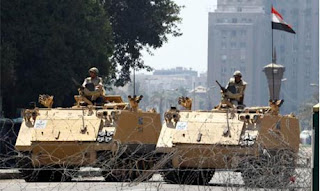Egypt: Muslim Brotherhood and Political Power
 |
| Tahrir Square in Cairo August 23, 2013. (Photo: Reuters) |
Press review – selected extracts
A bloody struggle is going on between the Egypt’s
generals and the Muslim Brotherhood for the control of the Arab world’s most
populous nation but also a strategic country straddling Asia and Africa that
operates one of the world’s major trade arteries, the Suez Canal, and which is
only one of two Arab countries to have a signed peace treaty with Israel.
A powerful political force
After the recent ouster of President
Mohamed Morsi in a military takeover, the Muslim Brotherhood faces a
decision about whether or not it wants to continue to engage in Egypt's
fractious political process.
Though removed from political
power, “the Muslim Brotherhood remains perhaps Egypt's most powerful political
force”, said Jeffrey
Martini, a RAND Middle East analyst.
“There is such severe political polarization and the Muslim
Brotherhood isn't going away, so it's hard to see domestic stability,” he added.
Source : RAND » The
RAND Blog » July 18, 2013 -
In Egypt, Polarization Stands in the Way of Stability (by — Scott Orr)
On going negotiations
With more than 830 dead and thousands of
others injured, Egypt’s military chief, Gen. Abdel-Fatah el-Sissi claimed on
Sunday (August 18, 2013) that the army would not seize political power but also
would not tolerate continuing unrest. He also called for the inclusion of Morsi
supporters in the political process.
“The Muslim Brotherhood is part of
Egyptian society. You cannot isolate it,” said Bashir Abdel-Fattah, a
researcher at Al-Ahram Center for Political and Strategic Studies in Cairo.
Source: http://www.mintpressnews.com/middle-east-realignment-after-egypt-coup/167213/ (By Dale Gavlak | August 19, 2013)
Avoiding the Algerian
scenario
The
Muslim Brotherhood was yet also a victim of its own mistakes, particularly the
failure of Morsi and his government to reach out to the secular opposition,
elements of which had contributed to his election. The Morsi government seemed to
have missed that a slim electoral majority is not enough, especially nowadays.
Moreover,
some secular intellectuals demonized the Muslim Brotherhood. Like their
Algerian counterparts – who in 1992 approved of the Algerian army’s suppression
of an Islamist electoral victory, leading to years of brutal fighting that left
perhaps a half-million dead – many Egyptians didn’t mind repressing Islamists.
Immediately
following the coup, the European Union adopted an ambivalent
position. This, too, was reminiscent of Algeria in 1992, when most European
governments supported the annulment of the Islamists’ electoral victory.
(Likewise, the EU refused to recognize Hamas’ electoral victory in the Gaza
Strip in 2006.)
Continuing
fear of political Islam in the West explains past support for dictatorial
regimes.
In
the long term, any crackdown on the Brotherhood would lead its members and
supporters – already disappointed in democracy – to reject elections entirely.
That outcome could have a negative impact on Islamist movements elsewhere. For
many, the extremists who criticized the Brotherhood and other Islamist parties
for choosing a democratic route to power will have been vindicated, and a new
wave of violence in the region may begin.
Alvaro de Vasconcelos is director of Projects for the
Arab Reform Initiative, a consortium of 16 think tanks in the Arab world and
the West, and coordinator of the Global Governance Group (GG 10). THE DAILY STAR publishes this
commentary in collaboration with Project Syndicate ©
(www.project-syndicate.org).


Comments